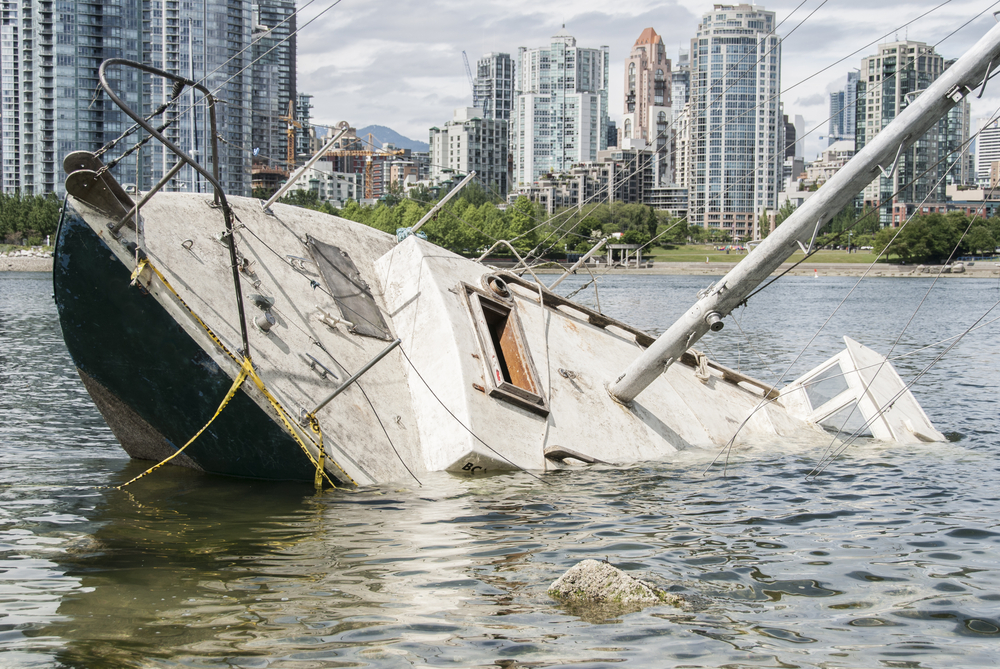There are endless ways in which an oil spill can affect marine life and habitats. Spills can cause some species to experience health problems and can lead them to suffer illnesses that will eventually take their lives. Unfortunately, accidents are still happening that are causing oil to spill into the water where thousands of marine creatures make their homes.
Just weeks after the Coast Guard cleaned up an oil spill on the Mississippi River following a barge collision, the organization is back at the scene responding to yet another oil spill accident, this time near the Interstate 10 bridge in Baton Rouge, Louisiana.
The Coast Guard Sector New Orleans was notified of the spill last Thursday. Two barges were discharging fuel at transfer station facility when a third barge struck one of them, causing a transfer connection hose to fall into the water, spilling fuel into the river.
Although the Coast Guard Marine Safety Unit Baton Rouge, the OMI Environmental Services and Louisiana Oil Spill Coordinator’s Office were quick to arrive on scene to respond to the accident, the fact that two barge accidents have occurred in the river only weeks apart from each other is alarming.
The other accident took place in January, when a barge that had been transporting 80,000 gallons of oil crashed into a railroad bridge in Vicksburg, Miss., spilling crude oil into the Mississippi River.
The owner of the latest barge to be involved in an accident, Blessey Marine Services, has assumed responsibility for the spill, but this means that the company may face several fines and penalties, not to mention costs associated with the cleanup. No injuries were reported, but had any crewmember been hurt, Blessey may have been found at least partially responsible for their injuries and might have had to cover expenses related to medical treatments or trauma.
Pollution investigators from Marine Safety Baton Rouge continue to survey the area to assess the extent of the spill, while local, state and federal organizations are working together to contain it and clean up the affected areas as quickly as possible.
An actual cause of the barge accident remains unknown, but the Coast Guard is investigating the matter. In the meantime, the Mississippi River remains open but the Coast Guard has advised vessels in the area to reduce their speed.
The maritime accident comes at a time when tensions are high in the maritime industry. Both commercial vessels and cruise ships have a responsibility when it comes to maintaining safety, not only of those onboard their vessels, but also for marine life.
The International Maritime Organization (IMO), an agency charged with the responsibility of maintaining the safety of shipping vessels and the prevention of pollution, has outlined many rules that vessel operators must follow in order to protect marine life. Since 1959, the organization has introduced several measures to improve the design of shipping vessels, onboard equipment, training for crewmembers, and navigation.
The IMO explains that roughly 2,400 million tonnes of crude oil and oil products are transported by oil tankers around the world by sea. Specific measures have been introduced to regulate safety, including ensuring that oil tankers are safely built and operated, as well as designed to reduce the amount of oil spilled in the event of an accident. There are special requirements for tankers that shipping companies must abide by, but unfortunately, accidents are still taking place and endangering marine life.
Although efforts by the organization to protect the environment have been strong over the years, it appears as though the efforts of some maritime industry companies and leaders to save money and cut corners when it comes to safety is stronger.
While the nature of the barge accident remains unknown, it seems as though the majority of maritime collisions are caused by negligence. Negligence in properly training crewmembers on how to safely operate a barge, negligence in failing to maintain a safe speed and negligence in checking equipment for malfunctions.
It can take weeks or even months to clean up an oil spill, but it only takes a few minutes each day to properly train pilots and crewmembers.
Statistics show that oil tanker accidents are largest cause of water pollution. Even just a little bit of oil that spills into the ocean can have drastic consequences for marine life in the area.
Below are just some of the many ways marine creatures can suffer because of a negligent oil spill:
PLANTS – An oil spill can have disastrous effects on sea plant life, causing some species to die off completely. Since many marine creatures are herbivores, contaminated plants can also cause animals to become sick.
FISH – According to the U.S. Fish and Wildlife Service, adult fish that are exposed to oil may experience several health issues, including stunted growth, altered heart and breathing rates, enlarged livers, reproductive problems, and many more defects. Not only can oil get caught inside a fish’s gills, but if a fish eats plants or other organisms that were contaminated with oil, their eggs may also end up suffering the negative side effects.
BIRDS AND OTHER SEA MAMMALS – Like fish, birds and other sea mammals can eat oil-contaminated plants or other creatures and suffer several health problems or may be killed, sometimes slowly and painfully. When oil gets on an animal’s feathers or fur, it reduces their insulation, causing the creatures to die of hypothermia. Sea birds that get oil on their feathers can also lose their buoyancy, causing them to drown.
An oil spill is a problem that can take years to truly be fixed. Even after an initial or thorough cleanup, some oil can still remain in sediment upwards of 30 years, affecting generations of marine life.
As maritime safety when it comes to protecting people onboard vessels is a priority, so too is maritime safety when it comes to protecting the environment.
Photo Credits:
Top Right: Baton Rouge Mississippi River oil spill – wbrz.com
Middle Left: Mississippi oil spill damage – nola.com
Middle Right: IMO logo – nauticalmind.com
Bottom Left: Veterinarians clean an oil-covered brown pelican following oil spill – worldnews.about.com
Published on February 21, 2013
Categories: Maritime Disaster
Get Free
Consultation










